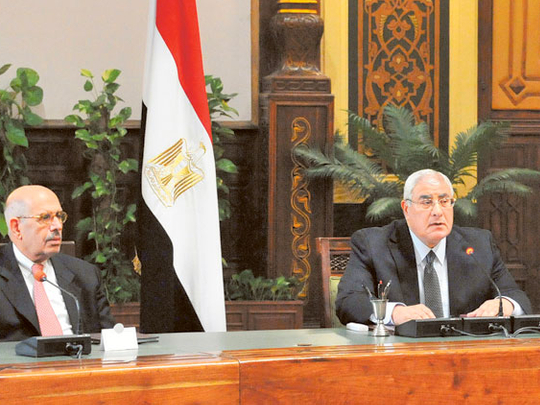
Cairo: There are mixed reactions to what the resignation of interim vice-president Mohammad Al Baradei could mean for Egypt’s transitional government.
Egypt’s April 6 Youth Movement, the group that led the movement that toppled former president Hosni Mubarak, said it “understood” the former Nobel Laureate’s resignation. “Al Baradei has humanitarian biases as well as biases for justice and freedom that contradict bloodshed, especially if it happens while he is in a public post,” said Khalid Al Masry, a spokesman of the movement.
Meanwhile, deputy head of the Salafist Al Nour Party Nader Bakkar described Al Baradei’s resignation as “the least that he could do”.
The party’s spokesman Sharif Taha described Al Baradei’s resignation as “a step in the right path”, stating that Egypt “desperately” needs national reconciliation.
Al Baradei has come under fire by hardline anti-Brotherhood forces, who denounced him for advocating a peaceful rather than a security solution to the Islamist issue. Al Baradei’s move could severely harm his political reputation since his own liberal comrades have been arguing that the Brotherhood should be treated like a terrorist organisation and banned.
Some journalists and talk-show hosts, who had close ties with the interior ministry under Mubarak, launched a defamation campaign against Al Baradei in an attempt to weaken his popularity. Scores of articles appeared charging him with promoting “foreign intervention” in domestic affairs by allowing European, African, American, Qatari and Emirati top officials to visit Egypt and meet with senior Brotherhood officials, including former president Mursi.
Abdullah Al Sennawi, a veteran columnist in Al Shorouq newspaper, told Gulf News that Al Baradei’s resignation will not affect the political roadmap unveiled by the army when the Mursi was overthrown. “We can’t deny the role that Al Baradei has played in the Egyptian revolution, but there is a difference between being a symbol to inspire young people and being a statesman who has to take serious decisions” Al Sennawi added.
“Al Baradei’s last move was a wrong decision at a wrong time. It may only leave effect abroad. It could give US administration or Turkey’s prime minister Recep Tayyip Erdogan a justification to denounce the dispersal of the non-peaceful sit-ins,” the political analyst said. “Al Baradei’s decision is a personal one and doesn’t represent the National Salvation Front (NSF),” said George Ishak, a politician and National Salvation Front leader. “We can’t downplay the role that Al Baradei has played in the national scene, but his resignation decision was totally wrong,” Ishak said.
Ishak doesn’t expect that Al Baradei, after such wrong move, could have any role to play in the future of Egypt. Al Baradei headed the NSF, the main umbrella opposition group to Mursi’s year in office. The group complained that it was not consulted before the decision was made to quit. “Al Baradei’s resignation would not affect the group’s total support for the interim government and its roadmap,” a statement by the NSF read.
Ahmad Darrag, a prominent leader of the Constitution Party, which Al Baradei is heading, denounced Al Baradei’s move. “Al Baradei’s move is an abandonment to his country at a time when Egypt needs him most to pass the current situation,” Darrag told Al Hayat TV. Other leaders of the Constitution Party called on Al Baradei to resign from his post as the party’s head. Tamarod (Rebel) campaign, the youth group behind the mass protests that ousted Mursi, said Al Baradei was dodging his responsibility at a time when his services were needed.
Mahmoud Badr, coordinator of the grassroots movement, expressed his dismay saying that “Al Baradei escapes from his national historical responsibility”.
“Al Baradei’s decision was expected, as he previously declared his opposition to using force against Mursi supporters,” said Abdul Rahim Ali, an expert on militant groups. Ali claimed that Al Baradei has threatened to resign on July 26 if the police attack on Brotherhood supporters went further or the Rabaa Al Adawiya sit-in was broken up by force.
The novelist and columnist Jamal Al Ghitani claimed in the state-run Al Akhbar newspaper that Al Baradei was “a danger to the Egyptian people and state”.
“Al Baradei cared more about his reputation as a Nobel Peace Prize laureate and his relationship with the US President Barack Obama than he did for the interests of the Egyptian people which lay in breaking up the Brotherhood’s sit-ins, whatever the cost,” Al Ghitani wrote.
The writer is a journalist based in Cairo.












